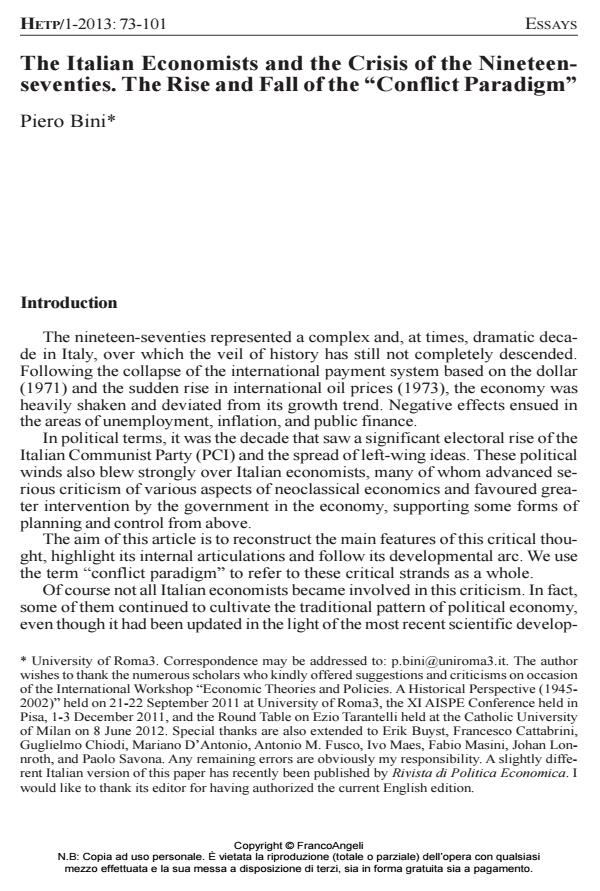The Italian Economists and the Crisis of the Nineteenseventies. The Rise and Fall of the "Conflict Paradigm"
Journal title HISTORY OF ECONOMIC THOUGHT AND POLICY
Author/s Piero Bini
Publishing Year 2013 Issue 2013/1
Language English Pages 29 P. 73-101 File size 131 KB
DOI 10.3280/SPE2013-001005
DOI is like a bar code for intellectual property: to have more infomation
click here
Below, you can see the article first page
If you want to buy this article in PDF format, you can do it, following the instructions to buy download credits

FrancoAngeli is member of Publishers International Linking Association, Inc (PILA), a not-for-profit association which run the CrossRef service enabling links to and from online scholarly content.
Between 1969 and the early nineteen-eighties a unique parabola took place in Italy that was both historical and theoretical. We are referring here to the birth, development and decline of a research project that had assumed Sraffa’s book Production of Commodities by Means of Commodities as its basic reference. At the beginning of this debate, the characteristics of Sraffa’s theory as an "open" scheme enabled it to produce a theoretical core having multiple derivations (both Keynesian and Marxian). In this system of scientific synergies a special role was played by the discussion concerning wages as "independent variable". The result was a meta-theoretical concept of wage as a price governed prevalently by social forces and power relations. We have called this complex research programme the "conflict paradigm". Successively the paper considers the reasons which, since the mid-seventies, started to corrode this compound doctrinaire alliance, first of all the intellectual disorientation caused by both the acute expressions of crisis in the second half of nineteen-seventies, and the criticism against the Sraffa’s theory as an "open" scheme, as a factor that deprived the study of economics of the solid anchor of equilibrium analysis.
Keywords: Italian economic thought, Sraffa, Keynes, Marx, Distributive conflict, Incomes policy, Stagnation.
Jel codes: A11, B22, B51
- Federico Caffè on the economic science in Italy Giovanni Michelagnoli, in HISTORY OF ECONOMIC THOUGHT AND POLICY 2/2020 pp.63
DOI: 10.3280/SPE2019-002003 - The social and political bases of political economy: interpreting and periodising Italian developments since WWII Emanuele Ferragina, Alessandro Arrigoni, in New Political Economy /2024 pp.770
DOI: 10.1080/13563467.2024.2344854 - Selective Neoliberalism: How Italy Went from Dualization to Liberalisation in Labour Market and Pension Reforms Emanuele Ferragina, Alessandro Arrigoni, in New Political Economy /2021 pp.964
DOI: 10.1080/13563467.2020.1865898 - Power in Economic Thought Piero Bini, pp.349 (ISBN:978-3-319-94038-0)
- Law and Development Flavio Felice, Luca Sandonà, pp.31 (ISBN:978-981-13-9422-5)
- An intellectual boost for Italy’s Europeanisation: the contribution of the influential think tanks Arel and Nomisma (1978–1993) Luca Sandonà, in The European Journal of the History of Economic Thought /2021 pp.324
DOI: 10.1080/09672567.2020.1817118 - Franco Modigliani and Ezio Tarantelli on Wage Moderation and Political Exchange: A Lesson to Be Learned in the New Age of Inflation Giuseppe Ciccarone, Giovanni Di Bartolomeo, in History of Political Economy 12303256/2025
DOI: 10.1215/00182702-12303256
Piero Bini, The Italian Economists and the Crisis of the Nineteenseventies. The Rise and Fall of the "Conflict Paradigm" in "HISTORY OF ECONOMIC THOUGHT AND POLICY" 1/2013, pp 73-101, DOI: 10.3280/SPE2013-001005